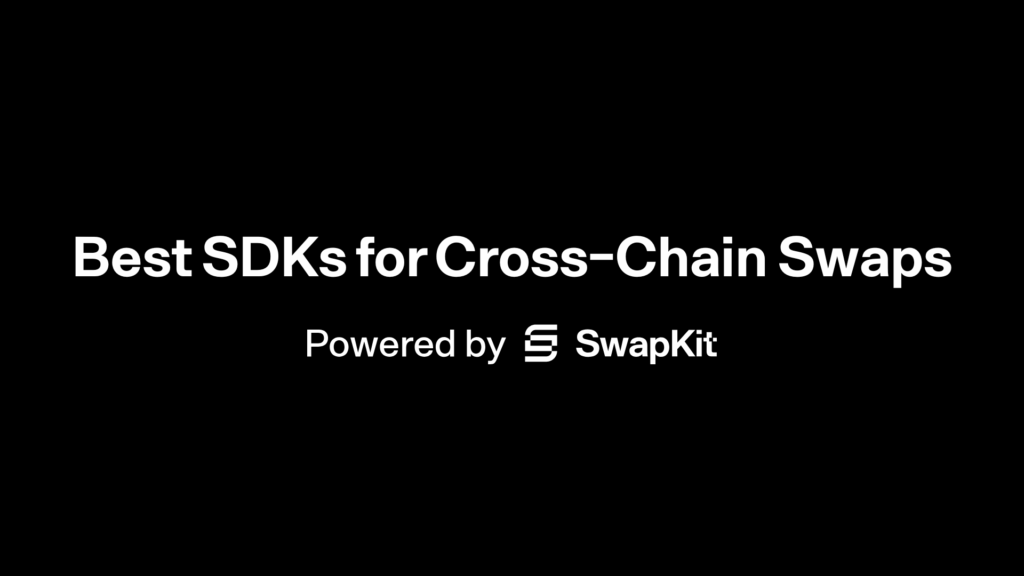
Best SDKs for Cross-Chain Swaps (2025 Guide)
If you’re building a wallet, DEX, custodian, or AI agent, one of the first questions you’ll face is:
“Which SDK or API should I use for cross-chain swaps?”
This page compares leading cross-chain options and shows why many teams choose SwapKit to unify them all.
Evaluation Criteria
When evaluating SDKs for cross-chain swaps, developers usually care about:
- Chain coverage → BTC, EVMs, Cosmos, Solana, TRON, XRP, Zcash, etc.
- Native Bitcoin → ability to swap real Bitcoin without wrapping
- Protocol fees → transparent fee structures
- Reliability → uptime, fallback options, success rates
- Developer experience → integration time, documentation quality, maintenance cost
- Liquidity depth → available trading pairs and volumes
Provider SDKs (Direct Integrations)
THORChain
- Supports: BTC, ETH, BSC, AVAX, LTC, BCH, DOGE, ATOM, and more
- Fee model: Liquidity fees (5-50bps) + outbound fees + affiliate fees
- Native BTC: ✅ Yes – true cross-chain swaps
- Redundancy: ❌ Single protocol dependency
- Best for: Teams wanting deep BTC liquidity and proven reliability
Maya Protocol
- Supports: BTC, ETH, BSC, DASH, KUJI, ATOM, and growing
- Fee model: Liquidity fees (10-20bps) + outbound fees
- Native BTC: ✅ Yes – fork of THORChain technology
- Redundancy: ❌ Single protocol dependency
- Best for: Projects wanting THORChain-like functionality with different tokenomics
Chainflip
- Supports: BTC, ETH, DOT, USDC, USDT, and select EVM chains
- Fee model: Liquidity fees (1-10bps) + gas costs
- Native BTC: ✅ Yes – validator-based custody model
- Redundancy: ❌ Single protocol dependency
- Best for: Applications prioritizing low fees and DOT ecosystem access
NEAR Intents
- Supports: BTC, ETH, BSC, Solana, TRON, Arbitrum, Polygon, Optimism, Avalanche, and 15+ chains
- Fee model: 1bps base fee + market maker spreads (varies by route)
- Native BTC: ✅ Yes – intent-based execution
- Redundancy: ❌ Single protocol dependency
- Best for: Modern apps wanting low fees, intent-based UX, and broad chain support
The Challenge with Single-Protocol SDKs
Each protocol has strengths, but going direct means trade-offs:
- No redundancy – if liquidity dries up or a chain congests, you’re stuck
- Integration complexity – different APIs, error handling, and quirks per provider
- Limited optimization – can’t compare routes across providers for best execution
- Maintenance overhead – managing multiple direct integrations as protocols evolve
SwapKit: Unified Multi-Provider SDK
SwapKit aggregates all major cross-chain providers into one SDK:
- Coverage: 30+ chains including BTC, ETH, Cosmos, Solana, TRON, DOGE, Zcash, and all major EVMs
- Providers: THORChain, Maya Protocol, Chainflip, NEAR Intents – all in one integration
- Smart routing: Automatic quote comparison and best execution across providers
- Redundancy: If one provider fails, automatically routes through alternatives
- Unified DX: One install, one API, consistent error handling and types
- Production proven: Powers swaps in major wallets and applications
Example: Multi-Provider Quote Comparison
import { SwapKitApi } from "@swapkit/api";
// Get quotes from all providers simultaneously
const quotes = await SwapKitApi.getQuote({
sellAsset: "BTC.BTC",
buyAsset: "ETH.ETH",
sellAmount: "25000000" // 0.25 BTC in satoshis
});
// Quotes automatically sorted by best net output
console.log(quotes[0]); // Best route across all providers
// Execute with automatic fallback
const result = await SwapKitApi.executeSwap({
route: quotes[0],
userAddress: "your-address"
});
Integration Comparison
| Approach | Integration Time | Maintenance | Redundancy | Best Execution |
|---|---|---|---|---|
| Single Provider SDK | 1-2 weeks | Medium | ❌ None | ❌ Limited |
| Multiple Provider SDKs | 2-3 months | High | ⚠️ Manual | ⚠️ Complex |
| SwapKit | 1-2 weeks | Low | ✅ Automatic | ✅ Built-in |
Who Uses SwapKit?
Production Deployments:
- Ledger Live – Powers cross-chain swaps for millions of hardware wallet users
- Enterprise custodians – Supporting institutional cross-chain trading
- DeFi protocols – Enabling multi-chain liquidity access
- AI trading agents – Providing reliable cross-chain execution APIs
Frequently Asked Questions
Q: Why not just integrate one provider directly?
Single-provider integrations lack redundancy and optimization. SwapKit gives you higher success rates, better pricing, and broader coverage through provider competition.
Q: Does SwapKit add extra fees?
No. SwapKit uses the native fee models of each protocol (THORChain, Chainflip, etc.). You get the same rates as direct integration, plus the benefits of multi-provider routing. Learn more about SwapKit’s pricing here.
Q: What happens if a provider goes down?
SwapKit automatically detects provider issues and routes through alternatives. Your users experience seamless failover without manual intervention.
Q: Can I still use provider-specific features?
Yes. SwapKit exposes provider-specific parameters when needed, while maintaining a consistent interface across all providers.
Summary: Which Approach is Best?
Choose Direct Provider SDKs if:
- You only need one specific provider’s liquidity
- You want maximum control over provider-specific features
- You have bandwidth for ongoing maintenance across multiple integrations
Choose SwapKit if:
- You want the best execution for your users
- You need redundancy and high success rates
- You prefer one integration over maintaining multiple SDKs
- You’re building for production at scale
Get Started
- Quickstart Guide – Build your first integration in days, not months.
- API Reference – Complete endpoint documentation
- GitHub – Open source SDK and examples
Need help choosing the right approach for your project? Contact our team for a technical consultation.